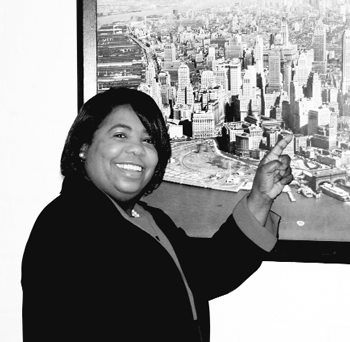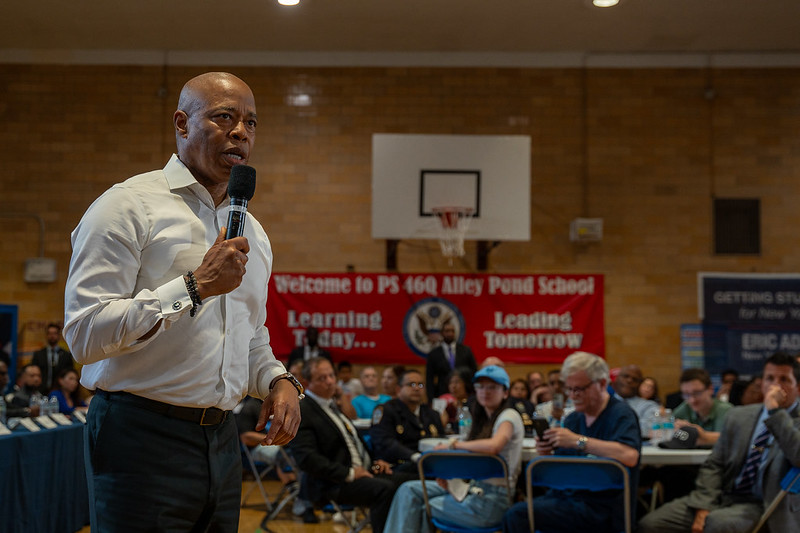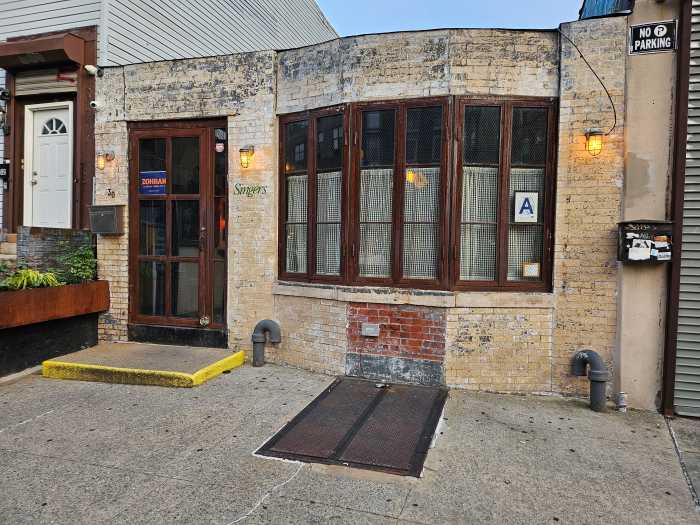By Lincoln Anderson
Two more candidates have thrown their hats into the ring for the race for City Council District 2, the seat currently held by Margarita Lopez, who will be forced out of the Council after 2005 because of term limits.
Planning to run in the September Democratic primary are Reverend Joan Brightharp, 61, an East Village minister and Community Board 3 member, and Gur Tsabar, 31, an aide to City Council Speaker Gifford Miller and formerly an aide to Upper East Side Councilmember Eva Moskowitz.
The two other announced candidates in the race so far are District Leader Rosie Mendez, 41, Lopez’s former chief of staff, whom Lopez has endorsed, and Brian Kavanagh, 37, a former aide to Upper West Side Councilmember Gail Brewer.
The sprawling Council District 2 stretches from Murray Hill down to the Lower East Side. Lopez — who plans to run for Manhattan borough president — has represented it since 1998.
“Do you have a flag? Do you have an American flag in here? We dealin’ with America, right?” said Brightharp, getting ready to pose for a photo at The Villager’s office recently before an interview. The flag is her campaign logo.
A native of Georgia, Brightharp, came to the East Village in 1964 to pursue a singing career in a secular group called the Barbettes. The granddaughter of a preacher, 14 years ago, she started up Greater New Hope Missionary Baptist Church of Christ on E. Ninth St. She lives in the Jacob Riis Houses and has been a member of Community Board 3 for five years. She has one son and, as she puts it, is “very single.”
She says she is running because the District 2 seat is vacant and because there are neighborhood issues that are not being addressed, particularly bars, which she charges have increased under Lopez’s watch.
“There are too many bars in our community. The community is just swamped with bars — Avenue A, Avenue C,” she said. “I have no problem with development, prosperity in our community, but bars are not [contributing to] our beneficial aspect.”
Brightharp noted that although last April Community Board 3 passed a sweeping moratorium on new bars in heavily saturated areas, she hasn’t noticed any effect.
“I’m still seeing more bars,” she said.
Several times during the interview Brightharp said she is “not trying to start a war” with Lopez and Mendez.
“This is a positive campaign to bring the community together,” Brightharp said. However, she then went on to say that Lopez hasn’t done enough to reach out to the area’s African-American community.
“She didn’t address the issues that affected the African-American community at all. She excluded the African-American community from the process,” Brightharp said. “She didn’t do anything for us, zero, zip, nothing.”
(According to Prime New York, the district’s racial breakdown is roughly 66 percent white; 25 percent Hispanic; 6 percent black; and 3 percent Asian.)
Asked if she could think of something positive Lopez had done, Brightharp thought about it for a moment, then said, “I can’t even say anything nice about her.”
Housing is another important issue to her.
“Affordable housing is a great problem that we’re having down here,” Brightharp said. “We have people on the Lower East Side living in their parents’ housing.”
Other issues of concern to the reverend are providing summer employment and job training for local youth and trying to end the “revolving door” by which prisoners who are released often wind right back in prison.
Brightharp is counting on the support of six black churches in the East Village and Lower East Side.
Also endorsing her campaign is chief Lopez nemesis, former District Leader Roberto Caballero, head of the Committee to Defeat Margarita Lopez. Caballero’s political group, Lower East Side Political Action Committee, is backing Brightharp.
“Don’t forget to mention Robert — he’s a vital part of this,” said Brightharp. Caballero said he found out Brightharp was interested in running, then hooked up with her campaign. He came along for Brightharp’s interview at The Villager’s office equipped with Campaign Finance Board filings of bar owners’ contributions to Lopez’s last campaign and a “report card” he compiled on Lopez’s effectiveness. Not surprisingly he gave her an “F.”
“I wish I could have given her a ‘G,’ ” he harrumphed.
“I’m glad I’m not running against him,” Brightharp said.
If she wins, the reverend said there will be a shakeup on Community Board 3, which she also blames for allowing the explosion of bars to occur. She would use her appointments to the board to remake it.
“If I’m elected the whole community board will be changed,” she vowed. “It’s the community board that allowed this to happen. If they don’t get in the race and support me — they’re going to be off.”
When she posed for the photo, Brightharp pointed to a map behind her of Lower Manhattan — which is in District 1, not District 2.
“It doesn’t matter — don’t you know I’m running for Congress in two years?” Brightharp quipped, before asking who the congressmember for that area might be.
Just as for Brightharp, this is the first time Gur Tsabar is running for office. Tsabar (pronounced “Suh-bahr”) lives in Murray Hill on 33rd St., though he formerly lived in the East Village. His parents immigrated from Israel to Texas, where he grew up.
“Unfortunate circumstance,” he noted of his Lone Star roots at the start of an interview at Pete’s Tavern on Irving Pl. “I have no yearning to go back. Philosophically, it’s very hard to swallow. Our current president, case in point.”
Tsabar said ever since he was a child he felt drawn to New York. He attended Wharton School of Business but eventually found the business world wasn’t where his passion lay. He was interested in politics from an early age, something he picked up while visiting his grandparents in Israel.
“In Israel then — and still — voting is a very emotional expression,” he noted, explaining how at age 7 he used to set up a mock voting booth in his grandparents’ house and have people vote at it.
He’s currently advisor to Speaker Miller’s director of policy and communications.
“Basically speaking, I want to make District 2 number 1 in every sense of the word,” Tsabar said. Issues he’s interested in are schools, affordable housing, providing access to healthcare for children who don’t have it and helping the working poor get access to services and benefits by educating them on what programs are available to them. As a child of immigrants who came to this country basically penniless, he says he’s very aware of helping everyone have a chance to succeed.
“If you can’t pay for childcare how do you move ahead?” he asked.
As for the incumbent, he said, “I think Margarita’s done a fine job. There’s a lot more that needs to be done — which is always the case.
“This is a very complicated district,” he noted. “Thirty-fifth St. down to Houston, and then all the way down the Lower East Side. There’s a lack of realization that what happens on the Lower East Side affects us all. We should all be concerned. At the end of the day, we’re all in this together.”
Tsabar makes it a point of attending meetings of the various community boards — 2, 3, 5 and 6 — that cover parts of the district. He doesn’t blame Lopez for the problems with bars in the East Village, noting that they are partly a result of the mayor’s smoking ban, which has led to increases in noise complaints from people smoking on the sidewalk.
“You go to a Community Board 3 meeting — one person after another: ‘I can’t sleep.’ I’m bummed that the system did not think through this ramification,” he said of the smoking law.
Tsabar is married to a former ballerina. He and his wife collected petition signatures to co-name part of E. 11th St. after Jodie Lane, who died last winter after stepping on an electrified Con Ed junction box cover.
“I think it’s a tragic, unbelievable story,” he said, “and I think it’s a tremendous disgrace that something as simple as a junction box could end someone’s life.”
He’s only just started fundraising.
“I’m probably the last in the game,” he noted.
By his side on the tabletop was his Blackberry cellphone/wireless Internet device. Tsabar said, if elected, he’d make a point of always being accessible.
“It’s an obligation,” he said. “It’s a full-time gig — no ifs, ands or buts — 24/7, that’s my work style.” He’d equip his staff with laptops to go to people to take their complaints, rather than have them come to the office. He might have a Web page with a blog where people could post concerns and complaints.
“Parts of this district are really young and those people tend to be totally Web,” he noted. “And you have to find a way to communicate with them.”






































